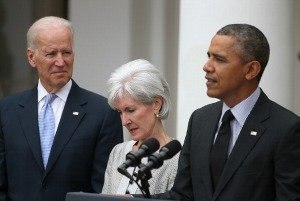The country is still highly divided over Obamacare, with many wanting to repeal it even as half of Democrats want to expand the law
The Affordable Care Act remains a divisive issue for Americans, despite the good news about large numbers of enrollments just before the deadline exceeding the program’s goal, and a website that finally seemed to work well after a disastrous start, supporting up to one million users at a time. Many Americans in recent Economist/YouGov Polls still need to be convinced of the value of the law and opposition to it continues to dominate.
In Economist/YouGov polls conducted throughout March and early April, nearly half the public continued to call the law a failure, with less than half that number seeing it as more of a success,
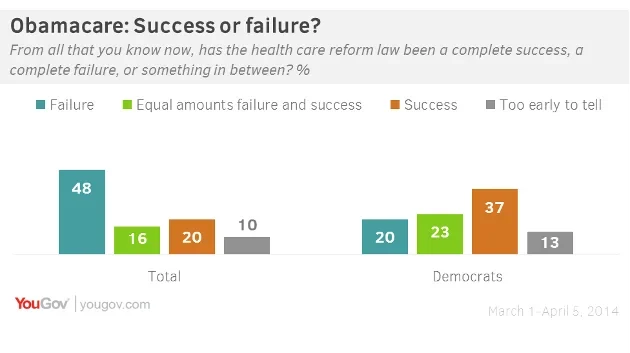
These results reflect a pattern of opinion established last fall, with no real change from opinion then. Americans don’t see positive media discussion of the law either. 51% say media coverage of Obamacare is mostly negative; only one in ten describe the coverage as positive. Few Democrats see favorable coverage, and they have become only tepid cheerleaders for the law. Just over a third of Democrats call the law a success. One in five cite it as a failure.
But what may be the biggest surprise in the data is the lack of improvement in evaluations of healthcare.gov by users. In the March and April polls, conducted after the website was functioning smoothly, nearly half of healthcare.gov visitors described their experience as negative. Less than a third said it was positive. And those who visited the website recently didn’t rate it all that much better than those who last visited in the site’s early, troubled days. Just under half of those who visited in February and March described their experience on the site as more negative than positive. That was somewhat lower than the negative assessments of those who last visited in October, when the website was pretty much non-functional, but no different from the response in other months.
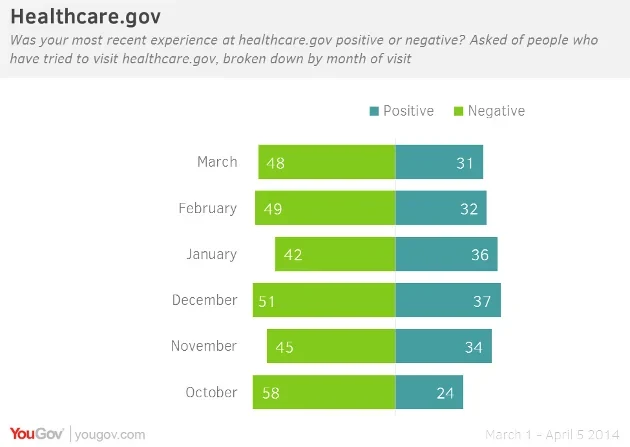
What has changed from the site’s early days is that most visitors in the later months were actually looking to buy insurance or for searching for information about insurance. In the first two months, more than a third of visitors to healthcare.gov said they were “just curious” about the site. In February, that dropped to 23%; in March just 14% of visitors said that was their prime motivation for visiting.
But the lack of change by month of visit in how the visit was described suggests that users may have been reacting not only to the functioning of the site itself, but also to the particulars of health care offerings, plans and prices. Those currently without insurance frequently cite price as the main reason they are uninsured, and the latest poll has other indications that some Americans attribute price rises and care issues to Obamacare.
33% of those with insurance coverage who have visited a doctor or ordered prescription drugs since January say their co-pay has risen; only 9% say it has gone down. One in five claim they were unable to make an appointment with a doctor when they needed to see one. However, coverage costs regularly rise, and Americans complain about increases every year (in earlier Economist/YouGov Polls some claimed their costs had risen because of the law even before it went into effect) and it is unclear how much of those problems, if any, are directly related to Obamacare.
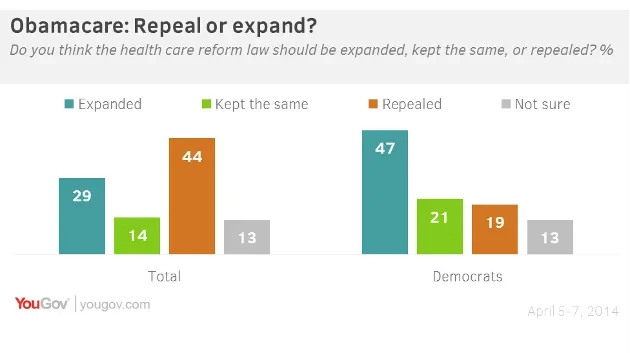
Still, 44% of Americans continue to say they want Obamacare repealed (though nearly half of Democrats say it should be expanded instead, and those who visited the website are evenly divided between expansion and repeal). When this group is asked what should happen to those who signed up for health care coverage under the ACA, most of those who want repeal believe those people should have the option of keeping or canceling their plans. About one in five who want repeal would cancel all policies bought under Obamacare.
But along with all the complaints and the continued divisions and negative evaluations of the program, there is one piece of good news in the combined March and April polls. More report having health insurance now than they did before the start of the year. And the increase in coverage is particularly striking among those under the age of 45. The percentage covered has risen three points among those under 30 and seven points among those between the ages of 30 and 44. There is almost no difference in reported coverage this year and last among those 45 and over.
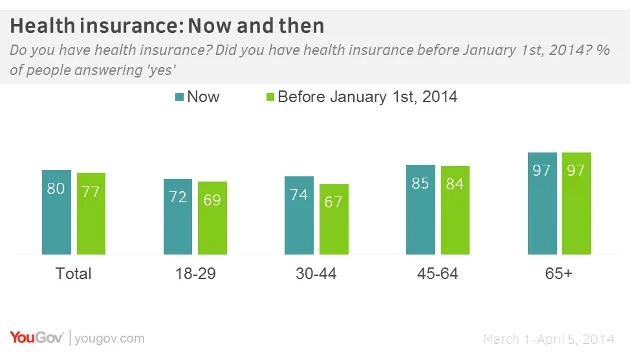
70% of those who visited the website now have coverage, three points higher than the percentage that said they had health care coverage last year.
Image: Getty
Full results can be found here.
Economist/YouGov poll archives can be found here.
